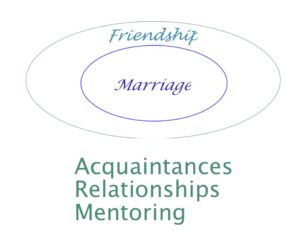Friendships Reduced to the Basest
Sentimentality Becomes Meaningless
Friendships are one of the most difficult relationships to define but the easiest to recognize; especially in modern life. Wikipedia defines friendship as, “a relationship of mutual affection between people”. The above graphic sentimentalizes friendship into a meaningless emotionalism. In essence, friendship becomes the means by which you either succeed or fail on your journey through life.
Unfortunately, most people do not take the time to understand or define their terms {Law of Identity}. This means that some terms are so commonplace that their definitions are assumed. Thus, the word friendship is assumed to have a certain meaning by one person and can mean something quite different to another; much to your determent I might add.
The New Testament uses several different words for love. It has commonly, but incorrectly, taught that agape is love from God while philia means “brotherly love”; however, these words are used differently by different authors making the above differentiations meaningless. Ancient Greco-Roman moralists also sought to clarify the issue of friendships with the same type of clarity and reaching the same muddiness of understanding. Why is this term so difficult to articulate? Perhaps because man does not recognize the major difference between people: some are saved {have a new relationship with God} while most are not {have a commonality of emotionalism uniting all peoples apart from God}.

Simplified Schematic of Personal Relationships
Various Degrees of Intimacy in Friendships
Marriage is not friendship. Marriage is a unique relationship comprised of one man and one woman united with God’s Spirit (Mal 2:15; Mt 19:1-6). Therefore, marriages are not friendships. They are unique relationships to provide godly children and mutual support that mirrors the relationship between Christ and His body on earth before the unsaved world (Ep 5:22-33). Friendships are relationships that God outside of marriage to assist each of us on our journey of spiritual maturation and witnessing in the world. Therefore, I will take the bold step, by modern standards, of saying that friendships are same-sex. Men have friendships with men and women have friendships with women. How better can a man find guidance in his responsibilities than with other men facing the same responsibilities; the same holds true for women. Outside of these two types of relationships are an array of relationships that vary from acquaintances to strangers to enemies. Some of these can be quite close but do not have the same degree of intimacy as friendships.
Inherent in intimacy is the understanding of a commonality of beliefs and values. This is where most confusion becomes apparent. For instance, the Bible speaks against marriages between believers and unbelievers for this very reason (2Co 6:14-15). Believers and unbelievers have vastly different understandings of right and wrong. The believer is informed by a living relationship with Christ based on His word. The unbeliever, though moral, has a different foundation of belief and values which have more in common with Lucifer and the world than with Christ. This same concept holds true for friendships. How can an unbeliever help a believer deal with spiritual maturity when the friend has no relationship with Christ. He, or she, cannot understand the truths of God for they are foolishness to him, or her (1Co 2:14). Therefore, the lost person not only cannot help one on the journey toward spiritual maturity but may actually be a determent. One cannot seek the advice of the lost who have little comprehension of the forces arrayed against you in your Christian walk.
Notice, I did not say Christians could not have relationships with the lost. If this was the teaching of the Bible then Christians would need to leave the world and Paul taught against this mentality (1Co 5:9-13). Paul does teach that Christians cannot have intimate relationships with the world but we will have relationships based on business, common causes, neighbors and even culture. This is how we are the light of Christ to the world. They see the differences in us and are either attracted to Him or repelled away from Him, and us. That will be their decision. Instead, many Christians have friendships, intimate relationships, with the lost based on the beliefs and values of the lost at the expense of Christ. These relationships are really mentoring relationships and eventually the person either comes to accept Christ or rejects both Christ and you since you constantly speak of Christ as the basis for all of your decisions and beliefs.

This contradictory slogan tells us that
most people do not understand friendships
The above slogan depicts the modern psychological {Satanic} approach to friendship standing in sharp contrast to the biblical teaching of friendship. The Bible teaches that friends are closer than family siblings {friends are by choice while siblings are by chance (from our perspective)} (Pr 18:24). The brother is our support in family adversity, though not always as demonstrated by Jacob and Esau or Isaac and Ishmael; however, a friend is always there (Pr 17:17; 1Co 13:4-7). These illustrate the nature of friendships but do not explain the need of friendship. Each of us sees ourselves as the “hero of our own story”. Because of our sinful flesh, even after salvation, we would condemn others before seeing the truth of ourselves; David and Bathsheba are an excellent example (2Sa 12:7-9). Friends do not accept you as you are but are the lens that shows us truly what we are then helps us to live as we should just as we should do the same for them (Pr 27:17). This is a foreign concept today.
Modern pseudoscience philosophies teach that friends do not criticize each other but consistently support each other. This discussed by Paul when he writes that the common bond between the lost is not their affection for each other but their commonality of sins (Ro 1:28-32). The old adage, “birds of a feather flock together” comes from this constant. Yet, even in this context the lost form shifting alliances that benefit them for the moment at the expense of others. This is why the believer cannot have friendships, but acquaintances, with the lost. The lost do not want to change from their sin, however much they may dislike the consequences. They have rejected the truth of God, the very truth the believer claims to rest within. This relationship must rest upon the discipleship of the lost or the believer’s rejection of spiritual growth in Christ. How can the believing” friend” tell the lost “friend” what they believe is wrong if not on the basis of Christ? Yet, this is exactly what friends are supposed to do, tell each other the truth and supporting their change with Scripture. Is not this the ministry of Christ in us? Is not this the purpose of the Hagiazo (Sanctification) Process with its testings designed by God to reveal that which we would gladly conceal?
Friendships are as rare and as difficult as marriages because we do not really want to know the truth of our sinful flesh. The worldly philosophies help us hide these sinful truths and attack those who act as true friends by labeling them as enemies, unloving or worse. True friendships can only occur between the saved who are maturing in Christ just as true marriages can only occur between the saved. The lost have no basis for either marriage nor friendship since love is an attribute of the Spirit and not of the flesh (Ga 5:19-24). They have relationships based on need and a kind of affection because they are in the image of God but without the power of God as we once were. Beloved, if we are walking with Christ then the lost will fall away at some point because they have enmity with Him, and therefore with us (2Co 2:14-15; Ja 4:4-5). Friends have their relationship through Christ Who never falls away, remember the recall of Peter after his rejection of Christ (Jo 21:15-19)? Friends are a gift from Christ to “round off” the sharp edges of sin as tools in the hands of Christ. To reject friends is to reject Christ and leave ourselves adrift on the Sea of Adversity subjected to every changing wind of doctrine leaving us ever more confused (Ep 4:11-16). Finally, beloved, do not confuse friendliness for friendship; the former can ensnare you while the latter draws you to Christ.

